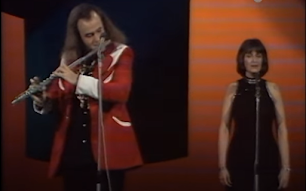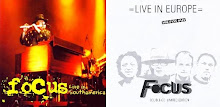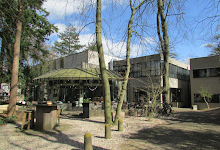 |
| van Leer on stage with Letty de Jong 1974 |
As with the religious element, the classical element in Thijs van Leer's music is quite prominent. In a previous article on Jan Akkerman we outlined the elements of Bach, Bartok and Rodrigo in the live act and on vinyl in Anonymus (In and Out of); Eruption (Moving Waves); Hamburger Concerto (especially Starter), Birth and Delitae Musicae (Hamburger Concerto); Father Bach (Mother Focus); P’s March and Spake the Lord Creator (Ship of Memories). It is difficult to know how far to go looking for such things. Van Leer admits in one place that the middle line of Focus 1 is lifted from a Schubert theme. The distinctive opening notes of Focus 3 are the opening notes of Tchaikovsky's Piano Concerto No 1 in reverse. Coincidence or not?
On post-Akkerman albums by Focus the classical element comes out most obviously on the Live at the BBC album, which includes a solo flute arrangement of a Bach Sonata and on the Focus 9 track Remember Mozart, which utilises the Alla turca from Piano Sonata No 11. (Mozart also features on a track by that name on the album Hommage aan Rogier van Otterloo). Again, however, there could be more. One fan detects strains of the first movement of Brahms' String Sextet (Op 18) at the beginning of Tokyo Rose and Brother (both on Focus con Proby).
Here we want to focus chiefly on the solo output and the most obvious place to begin is with the Introspection series, which began in 1972 while van Leer was still very much part of Focus. I remember getting the initial album as a 15 year old and, though not the sort of teenager who bought classical music, being quite impressed with it. I liked the line in the sleeve notes that said of van Leer 'meanwhile he studied the History of Art, took lessons in harmony and counterpoint at the Amsterdam Conservatory and painted many pictures'. Could this be the same man as the one who played on Hocus Pocus? Clearly a genius.
On reflection, this is very light classical music for the most part and van Leer never got any deeper. The first album includes orchestral rearrangements of Focus 1 and Focus 2, the delightful Introspection and Rondo by composer and arranger Rogier van Otterloo (1941-1988), the delightful Pavane (op 50) by Faure and two pieces from Bach (from the Mass in B minor, BWV 232 and the St Matthew Passion, BWV 244). Letty de Jong's voice and the whole set is quite charming. This is perhaps the best of the Introspection albums.
In this same period another track was recorded that appears on an obscure 1973 compilation album Metamorphose. It is entitled Siciliana and is again by Bach. Subsequent Introspection albums (2, 3, 4 and '92) continued in the same vein with Focus 3-5 plundered, the Introspection series extended to four and the Rondo one to three. Other non-classical tracks given the treatment include Mild Wild Rose, Carmen Elysium (P's March), Le Tango, Brother and Song for Eva, which was used as a TV Theme and Rondeau des Enfants (for UNICEF). More straightforwardly, classical raids were made on Baroque composers Albinoni, Bach (at least 7 tracks), Giazotto, Gluck, Handel, Purcell, Scarlatti, Stölzel and Teleman as well as Mozart, Schubert, Domenico Cimarosa (1749-1801), Gabriel Urbain Fauré (1845-1924) and Enrique Granados (1867-1916) and Jacques Offenbach (1819-1880).
Other albums have included classical work. For example, the 1981 album Reflections had several classical style pieces and included contributions from Bach, Telemann, Brahms and Ruggiero Leoncavallo (1858-1919). Later versions on CD added the popular Bolero by Maurice Ravel (1875-1937). The 1986 album Renaissance though not orchestrated has a classical feel and includes yet more Bach. Bach gets a similarly more updated treatment on the 1999 anniversary album Bach for a new age which revisits some of the tracks already attempted.
As for orchestral arrangements, these are also employed on two or three albums of hymns (including Instrumental hymns [also issued as 12 Mooiste Liederen] and The glorious album) and one of show tunes (Musical Melody). The first track on the second of these albums is Rule Britannia by Thomas Arne (1710-1788) a great favourite at the last night of the proms in London. Classical arrangements can also be found on the four Christmas albums (where Bach again features) and the very Dutch Geluckig is het land. On the second Christmas album opera star Elly von Ameling features.
Since 2004 the only obvious classical influence in the Focus repertoire has been on Talk of the Clown (Focus X) based on a work by the English composer James Hook (1746-1827).
Here we want to focus chiefly on the solo output and the most obvious place to begin is with the Introspection series, which began in 1972 while van Leer was still very much part of Focus. I remember getting the initial album as a 15 year old and, though not the sort of teenager who bought classical music, being quite impressed with it. I liked the line in the sleeve notes that said of van Leer 'meanwhile he studied the History of Art, took lessons in harmony and counterpoint at the Amsterdam Conservatory and painted many pictures'. Could this be the same man as the one who played on Hocus Pocus? Clearly a genius.
On reflection, this is very light classical music for the most part and van Leer never got any deeper. The first album includes orchestral rearrangements of Focus 1 and Focus 2, the delightful Introspection and Rondo by composer and arranger Rogier van Otterloo (1941-1988), the delightful Pavane (op 50) by Faure and two pieces from Bach (from the Mass in B minor, BWV 232 and the St Matthew Passion, BWV 244). Letty de Jong's voice and the whole set is quite charming. This is perhaps the best of the Introspection albums.
In this same period another track was recorded that appears on an obscure 1973 compilation album Metamorphose. It is entitled Siciliana and is again by Bach. Subsequent Introspection albums (2, 3, 4 and '92) continued in the same vein with Focus 3-5 plundered, the Introspection series extended to four and the Rondo one to three. Other non-classical tracks given the treatment include Mild Wild Rose, Carmen Elysium (P's March), Le Tango, Brother and Song for Eva, which was used as a TV Theme and Rondeau des Enfants (for UNICEF). More straightforwardly, classical raids were made on Baroque composers Albinoni, Bach (at least 7 tracks), Giazotto, Gluck, Handel, Purcell, Scarlatti, Stölzel and Teleman as well as Mozart, Schubert, Domenico Cimarosa (1749-1801), Gabriel Urbain Fauré (1845-1924) and Enrique Granados (1867-1916) and Jacques Offenbach (1819-1880).
Other albums have included classical work. For example, the 1981 album Reflections had several classical style pieces and included contributions from Bach, Telemann, Brahms and Ruggiero Leoncavallo (1858-1919). Later versions on CD added the popular Bolero by Maurice Ravel (1875-1937). The 1986 album Renaissance though not orchestrated has a classical feel and includes yet more Bach. Bach gets a similarly more updated treatment on the 1999 anniversary album Bach for a new age which revisits some of the tracks already attempted.
As for orchestral arrangements, these are also employed on two or three albums of hymns (including Instrumental hymns [also issued as 12 Mooiste Liederen] and The glorious album) and one of show tunes (Musical Melody). The first track on the second of these albums is Rule Britannia by Thomas Arne (1710-1788) a great favourite at the last night of the proms in London. Classical arrangements can also be found on the four Christmas albums (where Bach again features) and the very Dutch Geluckig is het land. On the second Christmas album opera star Elly von Ameling features.
Since 2004 the only obvious classical influence in the Focus repertoire has been on Talk of the Clown (Focus X) based on a work by the English composer James Hook (1746-1827).
Clearly then the classical influence is quite strong though it is only part of the mix.























No comments:
Post a Comment